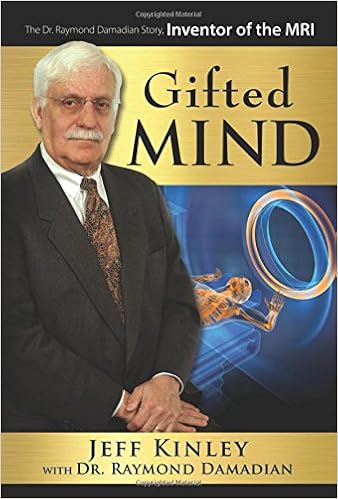
Gifted
Mind: The Dr. Raymond Damadian Story by Jeff Kinley
with Dr. Raymond Damadian
The story of Dr. Raymond Damadian, Inventor of
the MRI is a story of great ingenuity and belief. From the beginning, Ray was a brilliant
student and excelled in music and in scientific endeavors. The first chapter of the book, rather than
being an introduction to this life is more of an apologetic for the Christian
life. Damadian states, “Similarly, I
attribute the invention of the MRI entirely
to the Lord’s hand in revealing it to me. I credit His specific intervention to
accomplish it reduction to practice (15).”
Dr. Ray in the first chapter seeks to explain that to believe in a
closed system in which God never intervenes is to lose our access to His
truth.
Dr. Ray tells his early childhood story in the
second chapter and particularly illuminating was the part about his
violin. He started playing at the young
age of five and three years in he was encouraged to audition for Julliard. The audition was a disaster and Ray left
midway through. Yet, the school called
Ray back and obliged him to come back and finish the audition. With violin in hand, Ray was soon called to
study under Andrew McKinley at Julliard for the next seven years (26-27). Later on, after competing for a pre-placement
scholarship in the fields of math and science, Ray was selected to go to the
University of Wisconsin on a full ride scholarship.
It was not until later that Ray heard the call
of the gospel message, and this in fact from Billy Graham. Ray writes, “That night Mr. Graham explained
Jesus, my sin, the Cross, and faith in terms I had never heard before. And something supernatural happened as I
listened to his words. I understood the gospel and became convinced that I
needed salvation (33).” From this point
on, Dr. Ray’s life was never the same, meeting his wife Donna and incorporating
his faith into all of life, including his search for an anti-cancer
solution.
It wasn’t until June 18th, 1970 that
his first big cancer measurement attempt was done (58-59). From the a pulse NRM he made the test. The beauty of this finding is that the MRI
produces no radiation as a CT scan would (61).
From this point, Dr. Ray made many advances on his way to making better
the MRI but also asking for funding from all over the states, including money
from the President who had called for 6 billion dollars to be used for the war
on cancer.
This is a very interesting book that captures
the faith of one man and his discoveries in the scientific and medical
world.
Thanks to Master Books and Cross Focused
Reviews for the copy of this book in exchange for an honest review.
Comments
Post a Comment